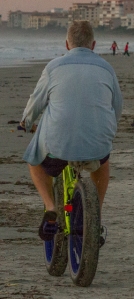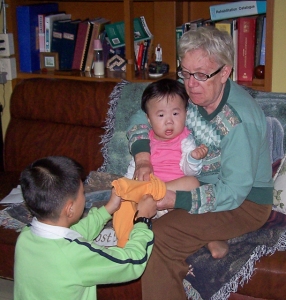Posts tagged ‘generativity’
Elderly people are…
Elderly people are (a) wise, vivacious, generous and wonderful to be around, or (b) bitter, resentful, stingy and just waiting to die? Which is your more common experience with older friends and relatives? Typically, old age seems to make people more themselves. If a person has always been happy and full of life, he or she is likely to be even happier and more committed to making the most of each minute, even from a hospital bed. If a person has been mean, self-centered and unpleasant, that personality is not likely to change in old age. Erikson labels these two extremes Integrity and/or Despair. He traces the path of integrity back to an adulthood of generativity, and the path to despair back to an adulthood of stagnation.
The choices which lead to generativity or stagnation begin at birth with the way we are treated and nurtured in our childhood. Last week we talked about Stage 1, from birth to one year of age, being Trust v. Mistrust. Stage 2 lasts from ages one to three and is the stage of Autonomy v. Shame/Doubt. Stage 3 spans ages three to five and teaches Initiative v. Guilt. Erikson has only eight stages in his Psychosocial Development map and the first three are completed by the age of five. Obviously, we are vulnerable to caretakers and parents for how our development begins.
We have a little more choice over the next three stages that span about thirty years, from five until about 35. Stage 4 is the stage of Industry v. Inferiority which encompasses ages five through eleven. Here we learn we are capable of accomplishing things, like learning to read, ride a bicycle, or hit a baseball. If no caring teacher, sibling, or parent spends the time and attention needed to help us master some learning challenges, we learn to feel inferior because of what we seem incapable of accomplishing. At this stage positive versus negative feedback is essential. We must be encouraged at the things we are good at and given enough variety of opportunities that we each become good at something or some range of things.
Stage 5 is adolescence, which traditionally ended by the time kids graduated from high school, but, according to current psychological studies, is lasting longer and longer, so that today we might say that adolescence lasts from eleven to 21 or 25. The major task of adolescence is Identity v. Confusion. Children who have trouble establishing their own personal identity will gravitate toward group identity, seeing themselves primarily as part of a sports team or a musical group or a clique of kids who dress a certain way or pursue common things. We start putting people in groups like the nerds or the popular people or the jocks. This explains the appeal of gangs, too. If young people don’t find personal worth and identity, they’ll cling to a group identity. “When you’re a Jet, you’re a Jet all the way from your first cigarette to your last dying day,” went the song the gang members sang in West Side Story. A gang, unfortunately, is a group of un-empowered people who feel worthless, inferior and confused. People who feel empowered, adequate, capable and focused do not resort to violence. They have a whole slew of ways for getting what they want, like working for things instead of stealing them.
Early Adulthood is Stage 6 and lasts from the end of adolescence until actual entry into adulthood itself. Just to put numbers on it we’ll say from the age of 21 – 35. The task of early adulthood is Intimacy v. Isolation. This stage, more than perhaps any other, is predictable based on experiences from the first year of life. If you were raised by a smother mother, a mother who bribed you for affection, a mother who withheld affection as punishment, a cold mother who didn’t snuggle and cuddle, or a mother, who for whatever reason, was incapable of meeting the needs of a baby – intimacy will be a foreign language for you as an adult. Here is the basis of promiscuous sexual behavior: kids who have not had an intimately loving and trusting relationship with a caregiver early in life will mix up sex and love and will use sex to try to coerce love from another. I will be very black and white here: That Never Works. People who are incapable or handicapped in the pursuit of intimacy are doomed to lives of isolation, even if they’re married and have children. Being surrounded by people does not satisfy the need for the emotional connection of intimacy. Living alone or being single does not mean living without intimacy. Intimacy is bonding, connecting and feeling a part of the whole. Isolation is insulation and the emotional seclusion of being set apart.
While Stages 1, 2, and 3 are done to us by our environment and the care taken of us, Stages 4 and 5 are already partially in our control, and Stage 6, young adulthood, is entirely in our power. The caveat, of course, is that we were formed in the first three stages. We are likely to remain our whole lives in those grooves into which we were first molded.
If we learned not to trust, not to have a sense of autonomy (independence), and not to show initiative, then, frequently, we will spend our lives being distrustful and riddled with shame, doubt, and guilt. We stay with what we know. As we are formed, so we grow. And these patterns and ruts may sadly stick with us until we are elderly and living lives of quiet desperation or unfettered misery.

The saving grace, of course, is knowledge of what we are doing. We, ourselves, are the only jail keeper we will ever have. If by good fortune and the Grace of God, we happen to learn that we are being held back by our early experiences, we can do something about changing our futures. I have often said to clients that their anxiety or anger or sadness is “in their bone marrow.” It’s deep. But knowledge frees it and starts shifting it. Knowledge IS power.
One freeing, shifting piece of knowledge is: “That was then, and this is now.” Then I was vulnerable and at the mercy of adults who didn’t know any better. Now I can learn, study, observe and change. I’m presently working with a young girl from a third world culture. She was afraid to tell me about her scary dreams. She explained to me that her mother told her that if you said your dreams out loud you made them come true. That piece of what we would call “folklore” would have silenced that young girl forever. She and I will be studying dreams, and she can draw her own conclusion on whether what she learned will become her truth, or whether she will choose an alternate understanding of dreams.
A second, related piece of knowledge is: “They taught me what they knew.” I am now free to teach myself (and my children) happier, healthier, more helpful things. I remember a woman telling me her mother made her and her siblings hide under the kitchen table whenever the weather was threatening. She now chooses to sit on her back porch with her children, watch the storm, and feel its energy. Her mother cooked with lard. She cooks with olive oil.
A wonderful teaching story used in family therapy is of the young bridegroom who saw his new wife prepare a pot roast to put in the oven. She cut off a big chunk from the end of the roast. “Wait,” he husband cried. “What are you doing?” His bride answered, “This is the way you make pot roast.” She explained that she was following the steps her mother always took. The young husband went to his mother-in-law and asked about her pot roast recipe. Sure enough, his new bride had it right. His mother-in-law told him she had watched her mother make pot roast just that way, and it was always delicious. Well, the young man was fascinated enough that he went to the nursing home and asked grandma about making pot roast. When he described cutting off the end of the roast, grandma started laughing. “Oh, those silly girls,” she finally said. “I never had a pan big enough for the roasts I bought. I had to cut off the end to make it fit in the only roasting pan I had.”
A third empowering piece of knowledge is: “Problems can be analyzed and fixed.” One woman I worked with told me that her parents always sent her and her brother to school dirty. She had no friends. She noticed that the girls who had friends smelled and looked clean. Despite the fact that there was no hot water in her house, she figured out how to get clean herself and how to wash her own clothes. Recently, she realized people at work seemed to avoid her. Being a cleanliness fanatic, she knew that was no longer the problem. She studied the behavior of her co-workers and tried honestly to compare it to her own. She noticed two obvious differences. The others smiled more and greeted each other when they first came into work. She was astonished the difference made by smiling and saying, “Good morning.” She said she felt awkward the first few days, as though she was a fake, but by the end of the first week people were actually saying, “Good morning” back and smiling at her. That made her start feeling like smiling, and it no longer felt artificial.
If you’re unsure how to tackle a problem you perceive, just look it up on the computer. “Major reasons people avoid each other.” Or, “How to attract friends.” Or, “Tips to be a better listener.” Or, “Qualities of trusted friends.” Whatever you want to know is in cyberspace just waiting for you to beam it down.
Tomorrow is Mother’s Day. Most of you reading this blog did not win the mother lottery and Mother’s Day is probably not your favorite holiday. I would suggest you be generous tomorrow, anyhow. A simple, “God bless you,” or “Happy Mother’s Day,” is not condoning or acceptance of what might have been some pretty miserable treatment at the hands of an abusive or neglectful woman. But, if you were not well mothered, you are likely to be clueless about the whole business of forgiveness – whether for her or for yourself. They usually go hand in hand. Mothers teach us forgiveness by forgiving us when we spill the milk and hit our siblings. They teach us forgiveness by asking their children to forgive them when they get snappy and short-tempered. Mother’s Day is a great day to practice forgiveness. Most of us mothers need our children to forgive us. None of us can look back and say we did it flawlessly. But most of us can look back and say we really tried hard. And I have never worked with a woman, no matter how shabby a mother, who intentionally set out to mess up her kids.
This forgiveness of which I speak I recommend be unspoken. I wouldn’t tell my mother or anyone else, “I forgive you.” I would just take the resentment out of the bag I carry on my back, and toss it into the creek. You don’t have to carry it anymore. It’s a useless heaviness.
Also, some of the best mothers in the world are not out biological mothers. Think about someone who nurtured you and walked with you and supported and affirmed you – or still does – and thank her tomorrow. It is fascinating that more times than not someone will step in to fill a void in our lives.
Blessings, courage and hope be yours – Susan
Thanks Mary Ellen Jelen!!
More support is waiting for you at manyfacesofptsd, manyfacesofdepression, manyfacesofanxiety and pillaroflightfoundation.org.
Generativity versus Stagnation
Generativity versus Stagnation is the stage of life most of us are in right now. You can count on me to let you in on such “breaking news.” We are all so busy living day to day that we aren’t thinking about things we’ve learned which might actually help us to live with greater fulfillment and happiness. Erikson’s Stages of Psychosocial Development shed a lot of light on how we live and help us understand why we feel and act the way we do in our everyday busyness. Remember: “The unexamined life is not worth living.”
I love the word “generativity.” I’ve never heard the word used anywhere else, but it‘s one of those words you can easily figure out. It looks like generosity and generate and even generator. So are we living generously, our lives running as though hooked up to a generator, which allows us to generate some production, some creativity, some results, or are we stuck and mired in the muck and living like a stagnant pool of water? This is the question we need to ask ourselves from time to time as we pass through adulthood: am I living a life of generativity or stagnation?
If we’re living in generativity, we’ll feel alive and exhilarated by life. We’ll have goals and plans and projects and purpose. We’ll feel like getting out of bed most mornings, and we’ll look forward to going to bed most evenings, because we’ll be tired from the work and accomplishment of our day. We’ll have to-do lists that we probably won’t finish every day, and we’ll have future goals, like, I’m going to learn how to knit, or, in my case, I want to go Zip Lining, which I really do.
My crooked little garden is a great source of generativity for me these days. I was outside last night until dark planting asparagus ferns, which won’t yield any asparagus for two or three years, and tiny little pepper plants which may or may not ever produce peppers, but the planting of fledgling, growing things and watching them develop is my salute to life and my belief in the future.
I heard a story in a sermon last Sunday which seems appropriate to re-tell. A woman was very dissatisfied with her life, so she decided to go to the mall to get herself cheered up. She wandered into a store and saw a man behind the counter whom she thought looked like the pictures she had seen of Jesus. She finally walked up to him and asked directly, “Are you Jesus?”
“Yes, I am,” Jesus answered.
“Do you work in this store?” the woman asked incredulously.
“Well,” he said, “This is my store.”
Then he invited her to look around and assured her she could have anything she wanted. He suggested she make a list of the things she saw that she would like and bring him the list when she was finished shopping. He would give her everything she asked for.
She did as he suggested and compiled a long list. Her list included such admirable choices as world peace, food for the hungry, shelter for the homeless, health and healing for the sick, and many more truly wonderful and altruistic desires. She wasn’t thinking just of herself when she made her list, but she was thinking of the whole world and how she might make it a better place.
Jesus smiled at her, approving her list, and reached under the counter and drew out packages of seeds and handed them to her.
“But,” she sputtered, “these are seeds. I won’t even be around to see these seeds grow and develop.”
“That’s true,” Jesus affirmed. “You’re not planting them just for yourself.”
Confused and disappointed, she put the packages of seeds down on the counter and walked out of the store empty-handed.
I love this story, and I bet you do, too. I think it is a wonderful story about generativity versus stagnation.
My grandmother taught in a one-room school for four years in the early 1900’s. Once she married granddad she was no longer allowed to teach. At that time only single women or men (I don’t know if they could be married) were permitted to teach school. When Gram was in her seventies and living in the other side of our duplex, I remember a student of hers coming to visit her. This was fifty years after she had taught him in school. She was so thrilled. She saw what had become of one of the seeds she had planted.
Last week I wrote about the mud and the stars. What do we focus on, I asked? Perhaps we can expand on that thought by asking ourselves if our focus is big enough, broad enough, long enough, grand enough. Can we see beyond our limited life span? Can we work for things outside our awareness?
Once my brother and I were grown and out of the house and no longer draining the family budget, my dad sent money once a month to support a child in Latin America or Africa or Thailand or somewhere he’d never been and would never go. When I would come home to visit, there on his desk would be the picture of this young man or young woman who had shoes or school books because this man in rural Pennsylvania chose to live a life of generativity. He chose to plant seeds he would never see flourish.
You know these generative people. You live beside them or work next to them or, I suspect, are one of them. These people are the members of the Lion’s Club and the community band and the church choir. These people are the baseball coaches and the 4-H sponsors and the volunteers in the emergency rooms and the hospice centers. Some people who live generative lives are obvious by how they live.
Many others who live generative lives are not so obvious. We never know who is donating financially or working behind the scenes to plant the seeds for the future. We don’t see the grandparents who sit and read or the neighbors who give rides to those who can no longer drive. There are so many ways to live generous and vital lives.
However, for those who suffer from PTSD, anxiety and depression, it is all too easy to get stuck in the stagnation pool. Here are some feelings which might indicate you are living in stagnation: distrust, shame, doubt, guilt, inferiority, confusion, isolation, regret, despair. These are words Erikson uses to describe how people feel when they miss important elements of ego development. If any of those feelings apply to you, it is not too late. We can go back and see what we might have missed and why. If you were raised by impaired parents, you will have been denied the necessary elements for normal and healthy growth.
Think of my poor little seeds in the garden if I don’t give them fertile soil and an environment where their little green shoots are safe from being trampled. Imagine those seeds denied the encouragement of the sunshine and the nutrients from the rain. Many of us as children did not receive all the essentials we needed to grow up healthy. Then we were at the mercy of adults who were either passing on the limited and stunted childhoods they themselves had received, or making poor choices without considering how their children and their children’s children would be impaired by those decisions. Whatever the case, now we are the adults. What do we choose? How are we going to live?
If we choose by default and fear to spend our days in stagnant ponds, we can expect some predictable results. Think of a stagnant pond in the woods. Who comes to visit? Snakes and mosquitos. How healthy is the water? It has no source of life and freshness flowing in, and it goes nowhere except back on itself. Things have to flow into us for us to be healthy – new ideas, good food, purposeful movement, laughter. Things have to flow out of us for us to be healthy – kindness, attentiveness, awareness. Did you see the moon last night? Did you notice the sunset? What kind of birds share space with you? Are you living in harmony with the planet?
Generativity is a choice. Like every other choice, it all begins with one baby step. I remember a woman who told her physician she wanted to start exercising. She mentioned that she lived near a park with one, three and five mile trails and thought that would be a good place to start. He shook his head, “No. Seven minutes,” he told her. “I want you to go outside every day and walk for seven minutes. Not eight. Not a mile. Seven minutes.”
Baby steps. Generativity can start (or continue or maintain) with one minute of deep breathing, one song belted out in the car which makes you feel energized, one smile bestowed or accepted. You don’t have to make a quilt. Just put in a stitch.
In the next weeks we’re going to return to Erikson’s stages of development and check on what we might have missed and how to make up for it now that we’re in control of our own lives. I think this will be empowering for all of us. We’ve all got little gaps in our ego development and how lovely it will be to head into the future with a lighter backpack. We’ll unload some of the distrust, shame, doubt, inadequacy, inferiority, confusion, isolation, stagnation and despair. It’s been a long time since some of us have sorted through that heavy load we carry on our backs. Anybody have back and shoulder pain, TMJ, Crohn’s, IBS, OCD?? That heavy sack might be taking its toll on your body and spirit. I expect my arthritis to improve when I unload mine.
Here’s our motto: Spring cleaning brings new meaning!!
Blessings and gratitude to Mary Ellen for the generativity she brings to this blog – and blessings and gratitude to each of you for your company on the journey – Susan
More support is waiting for you at manyfacesofptsd, manyfacesofdepression, manyfacesofanxiety and pillaroflightfoundation.org.












